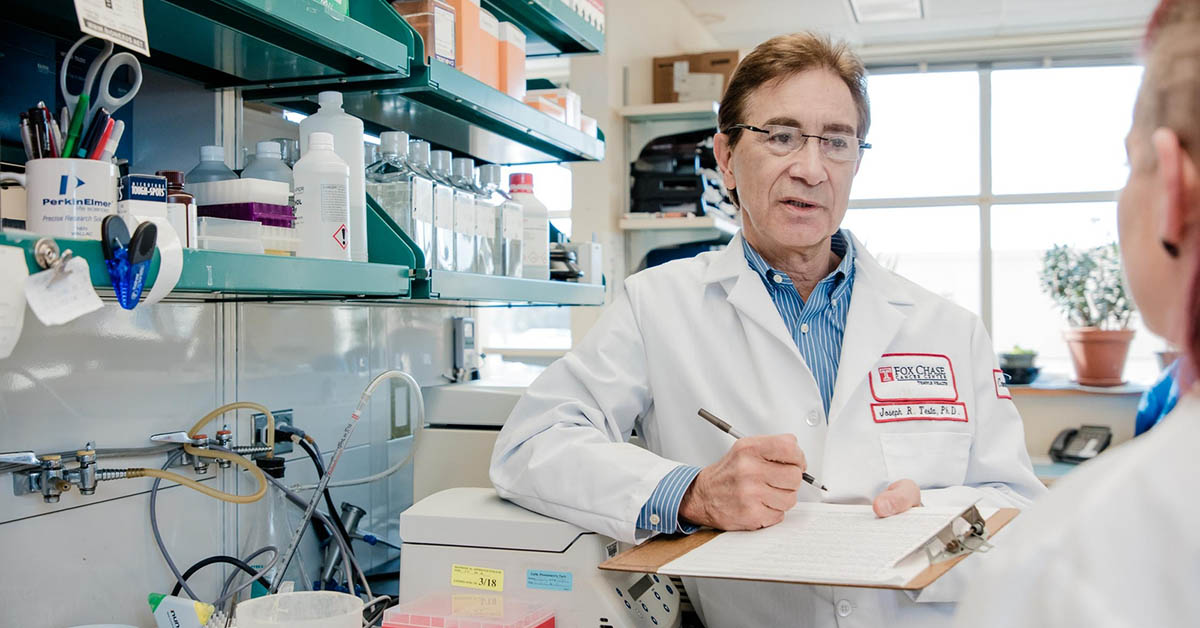
PHILADELPHIA (May 19, 2021)—In a study released today, researchers at Fox Chase Cancer Center and a team of international researchers identified a mutated gene called LRRK2 that may indicate a predisposition to malignant mesothelioma.
Malignant mesothelioma is an aggressive type of cancer that typically arises in individuals who have been exposed to asbestos. LRRK2 is a gene involved in regulating responses in immune cells in the brain.
“We found that most mesothelioma patients from high-risk cancer families have one to four inherited mutations in cancer-related genes that may predispose them to the carcinogenic effects of asbestos,” said Joseph R. Testa, PhD, FACMG, who conceived and supervised the study. Testa is professor and senior member in the Cancer Signaling and Epigenetics Program at Fox Chase; the study was conducted with other researchers at Fox Chase and at research centers in Italy and North Carolina.
“Nearly 50% of these mesothelioma patients have bona fide pathogenic mutations that are expected to contribute to disease susceptibility due to their predicted adverse impact on processes such as DNA repair and chromatin modification,” said Testa, who is also the Carol & Kenneth E. Weg Chair in Human Genetics at Fox Chase.
The goal of the research was to use whole genome sequencing to determine the types and frequency of germline (heritable) gene variants present in 13 malignant mesothelioma patients. The patients in this study were selected from a series of 141 asbestos-exposed mesothelioma patients with a family history of cancer but without a germline mutation in the BAP1 gene. One other asbestos-exposed patient from Italy had a family history that included six siblings who developed mesothelioma.
BAP1 is a tumor suppressor gene that is commonly mutated in familial mesothelioma cases; these mutations have been shown to contribute to malignant mesothelioma susceptibility. The researchers found that six of the 13 new mesothelioma patients exhibited one or more predicted pathogenic mutations in genes other than BAP1.
“Remarkably, in our study, Mitchell Cheung, PhD, first author on the study, found that two of the patients with mutations, including the one from Italy, affected a gene that has previously been strongly linked to Parkinson’s disease. When Mitchell searched The Cancer Genome Atlas database of genetic alterations in mesothelioma, he found that this gene is mutated in only about 3% of non-hereditary mesotheliomas,” Testa said. Cheung is an assistant research professor in Testa’s lab.
“Thus, we were surprised that expression of the LRRK2 gene was lost in 60% of the approximately 30 primary mesothelioma tumors and mesothelioma cell lines that we subsequently examined,” Testa added.
“Collectively, our data suggest that in addition to being a cancer predisposition gene, loss of expression of this newly recognized tumor suppressor gene is a frequent finding in mesothelioma and may serve as a biomarker for identifying those patients most likely to benefit from specific therapies that target pathways affected by LRRK2 loss.”
The researchers are now working to get funding to investigate how this specific gene becomes down-regulated in mesothelioma patients and how its loss of function contributes to the development of tumors.
The study, “Novel LRRK2 Mutations and Other Rare, Non-BAP1-Related Candidate Tumor Predisposition Gene Variants in High-Risk Cancer Families with Mesothelioma and Other Tumors,” was published in the journal Human Molecular Genetics.